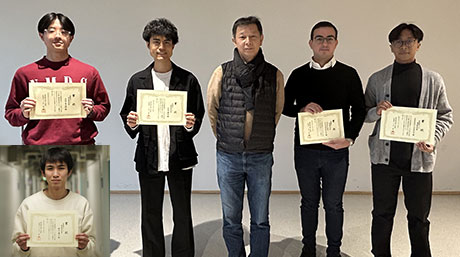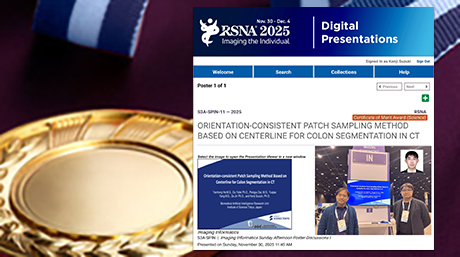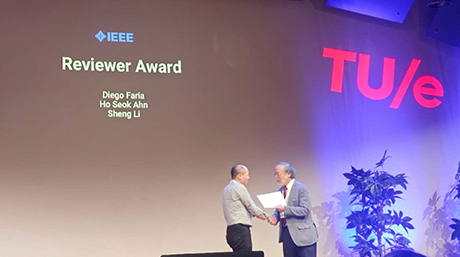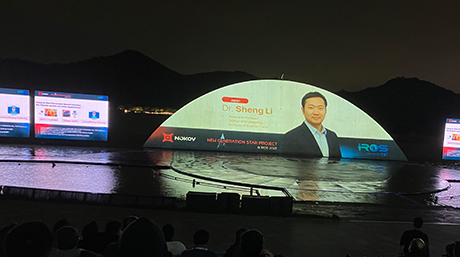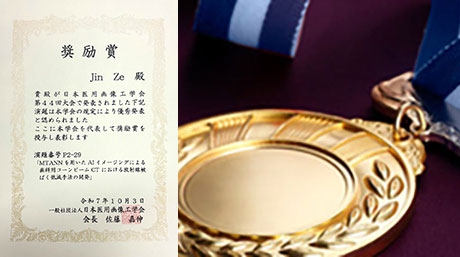Information and Communications Engineering News
Students proposing treatment of cataracts win 2nd Engineering School E×S Challenge
An interdisciplinary group consisting of students from Tokyo Tech and National Taiwan University have won the second E×S Challenge with their proposal for a treatment method for cataracts. The group collected the School of Engineering E×S Award and their JPY1 million development fund, supported by the Tokyo Tech Fund, after winning the LAUNCH contest — the final round of the challenge — on November 26, 2022.
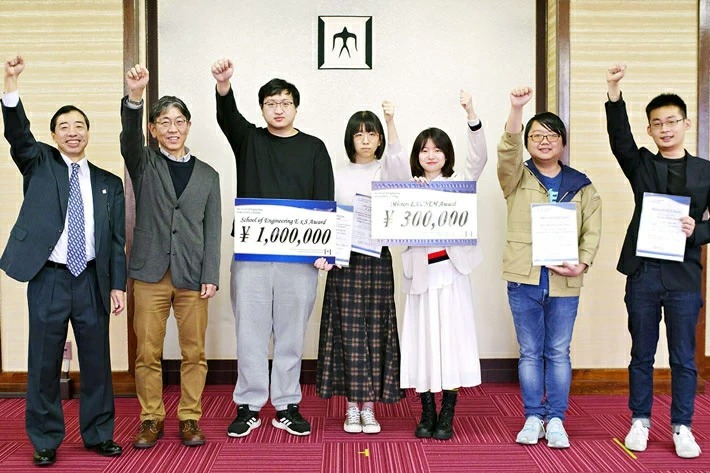
Winners at awards ceremony of 2nd E×S Challenge
The School of Engineering's E×S Challenge, held for the second time in 2022, encourages students and young researchers to utilize their engineering (E) skills and pitch feasible business ideas that aim to achieve a more sustainable society (S). The contest, which focuses on the achievement of the world's Sustainable Development Goals, rewards the most innovative participants with prize money and development funds to help them realize their solutions. The challenge consists of three stages — PITCH, STORM, and LAUNCH.
The second E×S Challenge included seven teams from Tokyo Tech's School of Engineering and five teams from universities in Taiwan. These 12 groups initially competed in the PITCH contest on September 3, 2022, with a 3-minute English presentation. This was followed by the STORM phase, in which groups were reorganized to achieve a dramatic evolution of ideas and a higher level of feasibility. During this phase, the original 12 groups were reshuffled into five groups, four of which were international teams that included members from both Japan and Taiwan. There were many obstacles during the discussions among members who had never met in person. However, the participants determinedly aimed to develop feasible business plans that can solve social issues with generous support from young and mid-career strategic consultants at the Consulting Division of Nomura Research Institute. All these efforts would culminate in the LAUNCH, the final judging event, held in November.
On the day of the LAUNCH contest, each group presented their business concept, consisting of innovative ideas backed by technology, to an audience consisting of both Tokyo Tech members and external professionals. The presentations were judged by an international panel of judges that included an Indian entrepreneur with a successful track record in sustainable business.
The judges selected a student group proposing a new method for the treatment of cataracts as the overall winners. The group was led by Biomedical Engineering student Wu Yueh-Feng from National Taiwan University and included sub-leader Yang Yuqiao, an Information and Communication Engineering student at Tokyo Tech.
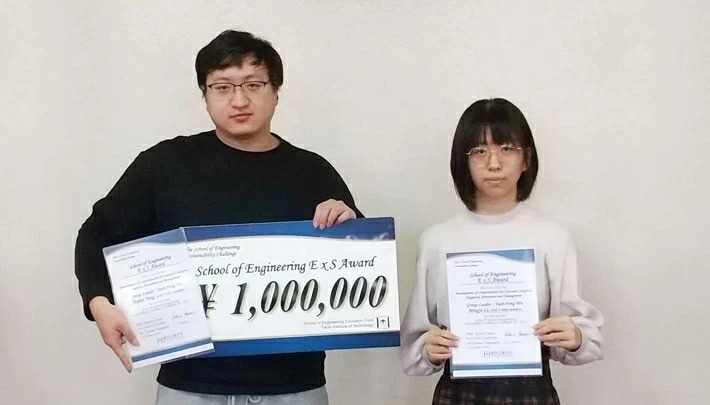
School of Engineering E×S Challenge Award winners from Tokyo Tech
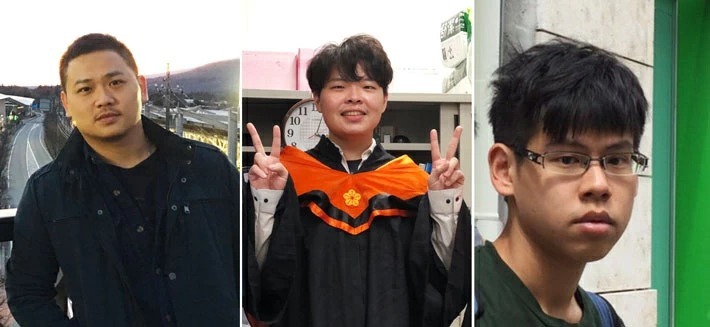
School of Engineering E×S Challenge Award winners from National Taiwan University
The Micron LAUNCH Award, given by the Micron Foundation to the best group of female leaders, was also presented to a group led by Chen Ying, an Industrial Engineering and Economics student at Tokyo Tech. This group, which proposed an educational system that utilizes 3D virtual spaces, collected JPY300,000 in development funds.
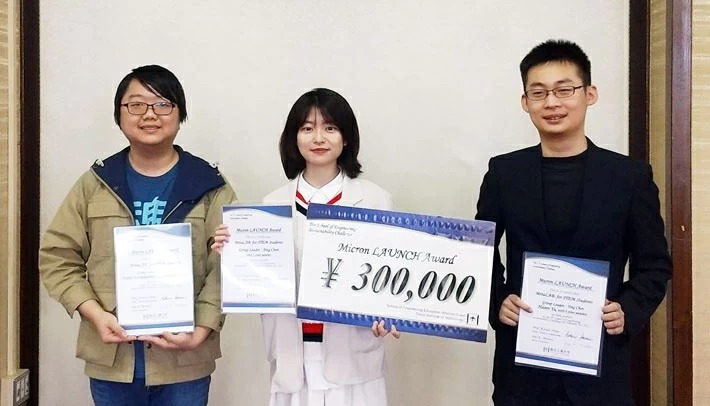
Micron LAUNCH Award winners
Each group will continue to develop their ideas while aiming to attract companies and investors who may want to supplement the resources provided by Tokyo Tech.
Comments from E×S Challenge Award winners
Leader Wu Yueh-Feng
National Taiwan University
I sincerely appreciate Tokyo Tech for holding this contest and changing its rules to allow Taiwanese teams to participate. This contest involved three stages, including PITCH, STORM and LAUNCH, enhancing our diverse abilities, including presentation, market analysis, searching unmet questions, and finding solutions. Therefore, I recommend this contest to people interested in innovative entrepreneurship, even though this journey remains challenging. During this contest, STORM was the hardest stage because it "was" an impossible mission to merge two independent groups while exploring a new direction. Fortunately, our mentors, Miss Onodera and Mr. Shigeta, took time out of their busy schedules and helped us to overcome difficulties. Particularly, I am grateful to Mr. Yang from team J7, who was communicative and responsible so that we could collaborate and complete the project smoothly. With these skills learned from this contest and the affirmation from the committee, I am confident that I will continue to make great efforts in this project to promote well-being and prevent people from vision loss.
Sub-leader Yang Yuqiao
2nd-year doctoral student, Information and Communication Engineering
It has been a great time in the ExS challenge this year. We got to team up with teams from Taiwan during the competition. There were so many discussions and help from my teammates and mentors. My doctoral studies focus on medical AI and this challenge guided me on how to transfer our research to real-world applications. It helped us to think about our research and technology from a business perspective and we received advice from industry professionals. From our original idea to the final launch stage presentation, we combined the future potential of our solutions with practical steps to achieve the plan. With help from mentors at Nomura Research Institute and advice from the judges, we began to extract strengths from our team and the Taiwan team and finally made it through. It was a unique experience to participate in this competition.
Comment from Micron LAUNCH Award winners
Leader Chen Ying
1st-year doctoral student, Industrial Engineering and Economics
We are very pleased to receive the Micron LAUNCH Award. The COVID-19 pandemic has brought great changes to the lives of all people around the world, and education is no exception. For STEM students, the failure to complete experiments caused by online education means that the learning effect has been greatly reduced. Our product, MetaLAB, combines the concept of Metaverse and VR technology, making it possible for STEM students to immerse themselves in experiments online. Our generation has witnessed the infinite possibilities brought by technology. With VR and AI technology, the meta universe seems to be in front of us. Thanks to the E×S Challenge for giving our team such an opportunity to show our software and technology. We are increasingly considering our business model under the guidance of our mentors and the professors, and trying to take the next step. Achieving the Sustainable Development Goals is the responsibility for each individual of our generation, and we hope that technology can make our life better in the near future.
With plans to further develop the E×S Challenge in the next year and beyond, Tokyo Tech's School of Engineering is expanding the scope of the competition to include more overseas universities. The executive committee encourages more prospective and current students of Tokyo Tech to boldly join the E×S Challenge and gauge the potential of their unique ideas.
The E×S Challenge is a project run by donations to the School of Engineering via the Tokyo Institute of Technology Fund.
- Group aiming for water conservation wins first School of Engineering E×S Challenge | Tokyo Tech News
- Twenty groups pitch business ideas at first School of Engineering E×S Challenge | Tokyo Tech News
School of Engineering
—Creating New Industries and Advancing Civilization—
Information on School of Engineering inaugurated in April 2016
Tokyo Institute of Technology iGEM is supported by Tokyo Tech Fund


